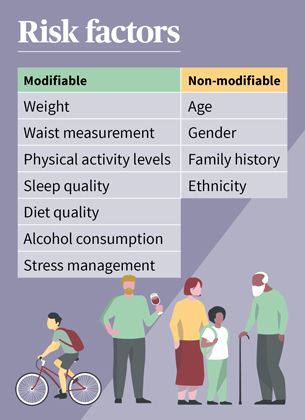Whilst you can see that there are a few non- modifiable risk factors, which are out of our control, there are many more modifiable risk factors that we can do something about to lower our risk of developing health conditions. By identifying any risk of diseases through a health check and understanding your health numbers, you’ll be able to discuss with your health professional what changes you can make to your lifestyle to impact your health for the better.
For example, if during a health check you find out that your blood sugar levels are higher than they should be, meaning you’re at an increased risk of type 2 diabetes, you can make lifestyle changes to bring your blood sugars into a healthier range. During your health check, you can talk with the doctor about the best next steps and changes you can make, such as getting more active and improving your sleep.
Identify any issues early with regular health checks
There are some conditions, known as non-communicable diseases, which can, in some cases, be prevented2. Conditions such as kidney disease, heart attacks, hypertension (high blood pressure), respiratory diseases, and type 2 diabetes can all be flagged in a health check, which is an important part of keeping your health, in check. Knowing any risk factors early on and being proactive with your health gives you the potential to prevent some illnesses and live with a better quality of health.
Whilst we can’t live completely risk free when it comes to our health, we can at least do our best to reduce these risks. With or without a health check, you can kick start a healthier lifestyle today.
If you’d like to know more about what happens in a health check, take a look at our Health Checks by age article.
The information in this article is correct at the time of publishing.
Sources:
1. Reasons why people do not attend health checks: a systematic review and qualitative synthesis https://bjgp.org/content/68/666/e28
2. https://www.nhs.uk/conditions/nhs-health-check/pros-and-cons-of-the-nhs-health-check/



